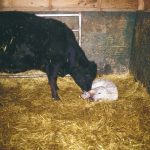
Sleeping sickness in horses
Veterinary Case Study: Symptoms of Western equine encephalitis and tips for preventing the disease
Jane’s desperate phone call came after school Monday afternoon. She had noticed something different with Sisco last night when she groomed him. Sisco, a Welsh-cross, failed to eat his oats, seemed restless and wanted to lay down. Getting up when urged became difficult. Her hunch something might be seriously wrong with her new pony turned […] Read more

How to detect polio in cattle
Vet Advice with Dr. Ron Clarke
Polio, or polioencephalomalacia, in cattle is not considered infectious, but rather a pathological condition — a diagnostic term describing necrosis of the brain’s grey matter. Clinical signs include: When first described, polio existed primarily as a thiamine deficiency but is now recognized as a metabolic disease involving several factors. Animals exhibiting signs of polio suffer […] Read more

Evolution and circadian rhythms of cattle
Vet Advice with Dr. Ron Clarke
DNA analysis has shown that domestic cattle descended from wild ox in southwestern Asia some 10,500 years ago. An international team of scientists from the Centre National de la Recherche Scientifique and National Museum of Natural History in France, the University of Mainz in Germany, and University College London in the U.K. conducted the study by […] Read more

Leptospirosis in people, dogs, horses and cattle
Vet Advice with Dr. Ron Clarke
The story about leptospirosis started during a dog walk with good friends as part of our daily outing. They knew little about zoonoses and the importance of disease transmission between animals and humans. A recent article on “Leptospirosis” Linda read in an agriculture journal piqued her interest on the diseases shared by humans and animals. […] Read more

Lead poisoning in calves
Veterinary Case Study: Oddly, young animals readily consume these materials when they encounter them
Jim called one morning upset about two three-month-old Holstein steers he had bought at the local auction market two weeks earlier. “I’m really sorry about calling. I know you have warned me about doing this, but calving season is over for me and everything went to pasture. They are really sick. Can you come out […] Read more

Lyme disease: maligned and misunderstood
Vet Advice with Dr. Ron Clarke
There is nothing good about Lyme disease, but it’s time to sit and make sense of what Lyme disease is and what can be done about it. Lyme disease is spreading in Canada. The disease itself is caused by a bacteria, Borrelia burgdorferi (Bb) spread from ticks seeking a blood meal. It’s not a serious cattle disease, […] Read more
Tough decisions ensue when rabies infects dairy cow
Veterinary Case Study: A farmer with a rabid cow wonders whether he and his family could be at risk
Jim stopped by the clinic to pick up vaccine, dewormer and meloxicam for processing calves on the weekend. He asked if we could talk privately. We went to my office and closed the door. “I think I have a problem and need your advice,” Jim said. “Just before coming to town, my 15-year-old son came […] Read more

Oil and cattle: When major industries collide
Vet Advice with Dr. Ron Clarke
There are currently just under 500,000 gas and oil wells in Alberta. Although difficult to find exact numbers, it appears nearly 5,000 new oil and gas wells are drilled across Western Canada every year. Capital investment for the Canadian oil and gas sector could reach $40.6 billion in 2024. It’s big business and much of it […] Read more

Hemlock: A deadly poison affecting spring and summer pasture
Vet Advice with Dr. Ron Clarke
Poisonous plants are a major cause of economic loss to the livestock industry. It’s estimated poisonous plants adversely affect three to five per cent of cattle, sheep and horses grazing the western range.

Have we learned anything about controlling zoonotics from COVID?
It was an anniversary of sorts this spring, with COVID officially turning four years old. Meanwhile, avian influenza leapt into ruminants, becoming known as bovine influenza A virus. Globally, COVID killed over seven million. Where it came from is still debated by scientists, but probably from a Wuhan fish market in China and probably from […] Read more



